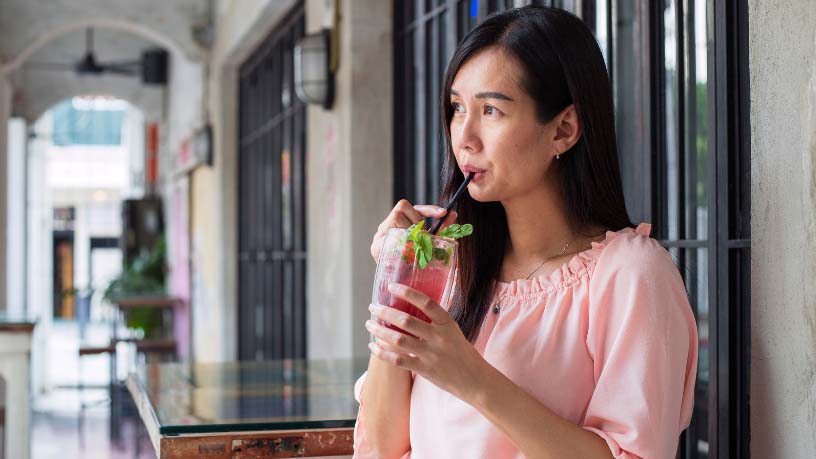On this page
Key takeaways
- Sober Curious means being mindful of your drinking habits.
- It doesn’t mean stopping drinking altogether, but it’s about choosing if and when to drink alcohol.
- Drinking less can help improve your physical and mental health.
What is Sober Curious?
Do you wonder what life might look and feel like with less alcohol?
That’s the idea behind the sober curious movement.
Rather than giving up alcohol entirely, “sober curious” means being mindful of your drinking habits, how they fit into your lifestyle and choosing if and when to drink.
You might ask yourself why you drink in the first place, or tune into how alcohol affects your mood, energy or relationships.
As a result, you might decide to cut back or take a break from drinking.
“The sober curious movement is relatively modern,” says Dr Chris Davis, Medical Director at Clean Slate Clinic. “It aims to challenge drinking culture and create less risky alcohol habits.”
Why is the sober curious movement popular?
This trend is a sign that, as a society, we’re becoming more health conscious, says Chris.
“People are more aware of exactly how harmful alcohol is for both their physical and mental health.”
The movement is growing, with one in 5 18 to 25-year-olds now drinking less than once a month.1
“We believe the rise of social media may have something to do with this shift,” says Chris. “Everyone has a camera in their pocket now, which means people are more conscious about being drunk in public.”
“There’s also more open dialogue between young people and their parents about issues that were previously taboo, including drug and alcohol use.”
“We like to think that public health messaging is getting through as well, because we know now that alcohol directly causes 7 or more types of cancer2 and has a negative effect on every system in the body.”
How to sustainably change your relationship with alcohol
1. Keep a drink diary
“Tracking your alcohol intake is really useful, because we don’t always realise how much we drink,” says Chris.
“A drink diary is a great way of holding a mirror up to your drinking habits and being very honest about it.”
2. Write a pros and cons list
“Writing a list of all the things you do and don’t like about drinking alcohol can be a valuable exercise,” says Chris. “Seeing these on paper, in your own handwriting, lays out a blueprint for what you would like your relationship with alcohol to look like. Can you have the pros without the cons?”
“You can update this list as your journey with alcohol changes; it doesn’t have to always look the same.”
3. Take a break
“Taking a break from alcohol by taking part in Dry July or similar is great,” says Chris. “If you can push the break to 3 months, that’s even better.”
“If you’re a daily or habitual drinker, the reward pathways in your brain have been remodelled to look for alcohol to bring pleasure,” says Chris. “This is often to the detriment of other things you might find enjoyable.
“We now believe it takes around 100 days to remodel these reward pathways. When these pathways are reset, you start to get dopamine from things you might have previously enjoyed before drinking took over.”
4. Talk about your relationship with alcohol
“Have honest conversations with your friends, family and loved ones about how you feel about alcohol,” says Chris.
“Be upfront about what you do and don’t like about drinking. This can help others understand why you might want to change your drinking habits.
“Be clear and say something like: ‘I like a drink on Friday with my mates but I hate the hangover the next day,’ or ‘I want to have a drink at a party but when I drink on Friday, Saturday and Sunday, it really ruins my mood.’ This is a great way of helping people around you understand what you want out of your relationship with alcohol.”
5. Have a plan
If you want to cut back on your drinking, planning your approach can take the stress out of the situation.
“Know what you’re going to say if offered a drink,” advises Chris. “This can make it easier to stick to your decision.”
Often, a ‘no thanks’ is enough.
If you’re curious about changing your relationship with alcohol, why not take the first small step? Try tracking your weekly drinks or skipping your next weekend glass and see how it feels.
Safe, supported alcohol detox at home
Resources
Clean Slate Clinic offers a range of treatments for dependence on alcohol, stimulants, cannabis and other drugs.
Alcoholics Anonymous offers free recovery programs around Australia.

At Bupa, trust is everything
Our health and wellbeing information is regularly reviewed and maintained by a team of healthcare experts, to ensure its relevancy and accuracy. Everyone's health journey is unique and health outcomes vary from person to person.
This content is not a replacement for personalised and specific medical, healthcare, or other professional advice. If you have concerns about your health, see your doctor or other health professional.
1Australian Institute of Health and Welfare (2022-2023) National Drug Strategy Household Survey, Australian Institute of Health and Welfare
2Cancer Council Victoria (2025) Ways Alcohol Causes Cancer. Cancer Council Victoria.
You might also like
How alcohol affects your body
That extra glass of wine you had last night may have more of an impact on your health than you realise.
Grey area drinking: When that extra glass is more than a treat
A nightly glass or 2 of your favourite drop to unwind can become harmful if you don’t know the signs of dependence.
The benefits of going alcohol free for a month
We all know drinking alcohol can have some pretty serious consequences for our health, but what happens when we stop drinking? Even just for a month?
5 mocktails for mindful drinkers
Going alcohol-free doesn’t mean you have to miss out on all the fun! Check out 5 of our favourite deliciously fruity and colourful mocktails.





